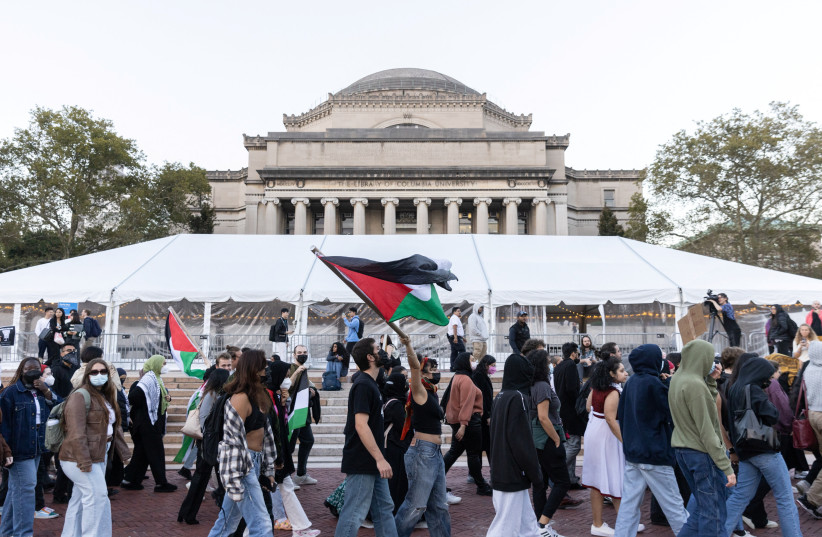It’s been almost five months since October 7, a day that completely changed the lives of more than 15 million Jews around the world. But the aftermath of the attack is still present, months later. In many ways, it feels as though this nightmare just happened, while at other moments, it’s hard to remember what life was like before that day of terror.
I am not fluent in Hebrew. I do not wear a kippah. I have almost 30 tattoos. I am not your stereotypical Jew, but I have become a proud Jewish activist. But October 7 changed me, as it did many others. Who I was before is someone I can never be again. I cannot be complicit or silent. I donate to the Anti-Defamation League; I speak at conferences wearing an #EndJewHatred T-shirt; I never leave home without Jewish-themed jewelry; and I use my social media platforms to discuss the rising antisemitism on college campuses across the United States and around the world.
As someone who was educated at a Jewish school and learned about the Holocaust, I am no stranger to antisemitism or the dangerous impact it can have. My earliest memories include being taught by my parents to be proud but quiet about my Judaism, having swastikas carved on my school playground, being immediately evacuated on September 11, and always leaving my Star of David at home when traveling.
During my childhood and teenage years, I heard from and met many Holocaust survivors, including Elie Wiesel. I listened to their stories about how the world remained silent.
Today, it feels like the beginning of a second Holocaust. That is why I cannot remain silent.

A scary time to be Jewish
For this Jewish New Yorker, it’s a scary time to be Jewish. The American Jewish Committee’s State of Antisemitism in America report found that 93% of American Jews surveyed think antisemitism is a problem in the United States and 86% believe antisemitism in the country has increased over the past five years.
In November, I attended the March for Israel in Washington. Around me were Jewish people from Atlanta, Chicago, Houston, New Orleans, Philadelphia, Richmond, San Diego, and Queens. A man from Brooklyn put tefillin (phylacteries) on me; it was the first time I had worn tefillin in almost 20 years. I even got to meet Julia Haart and Miriam Haart from Netflix’s My Unorthodox Life, who grew up in a religious community not too far from me. While there, I realized this gathering had the most Jews I’ve been around since I was in Israel in 2006. It was the safest I had felt in years. But there were also allies, including Congressman Ritchie Torres and CNN contributor Van Jones. That day reminded me of why I am proud to be Jewish and why I cannot be silent about my Judaism any longer.
Since October 7, I have lost hundreds of followers on social media. I have received anti-Israel and anti-Jewish messages, even threats. But I am not alone. The AJC found that six in 10 people have come across antisemitic content online, and 78% of American Jews feel less safe as Jews in the United States since that horrific day.
To many of us, the current climate feels different. We’re feeling angry, confused, and isolated. In my lifetime, I have watched the nation unite after domestic and foreign terrorist attacks, social justice actions, and wars. Rarely, outside of politics, have I seen us this divided: the Jewish community against everyone else. Overnight, people who had never spoken about any Middle Eastern wars became experts on the conflict. Disinformation spread like wildfire across social media, and much of it felt aimed at damaging or discrediting Jews and Zionists. Almost immediately after October 7, it was not only taboo to express sympathy for the Israelis who were captured or murdered; it was discouraged and forbidden, often met with attacks, both physical and verbal.
BUT THROUGH these painful months, there have also been glimmers of light.
During this period of mourning, I have watched people of all backgrounds come together – to educate, to grieve, to hope, and to pray. A Christian connection on social media thanked me for sharing educational resources. Jewish friends from elementary school and high school reached out. A Muslim friend held my hand as I cried, and another has been checking on me periodically for months. These are the moments I have chosen to cling to.
Our future is not where one side loses and another wins. It’s where we all unite.
The writer is an award-winning communications strategist, data storyteller, purpose-driven marketer, and educator based in New York City. He often speaks about antisemitism, LGBTQ+ rights, and social justice issues.
